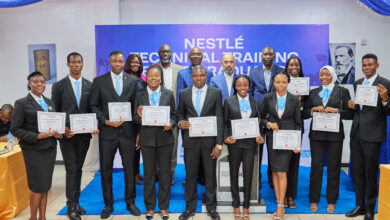Experts Give Insights On Current Dynamics Of Snacking In Africa

Consumers across Sub-Saharan Africa (SSA) are more discerning and open to trying new things when it comes to the snacking choices they make, creating an opportunity in the food sector to meet shifting needs.
This was the submission of experts at a virtual panel discussion on snacking, facilitated by Mondelez International, the parent company of Cadbury Nigeria Plc, recently.
The three panelists, who gave some insights on the current dynamics of snacking in Africa, included Arpan Sur, Senior Marketing Director, Sub-Sahara Africa (SSA), Mondelēz International; Frederick Ubanmhen, Head of Qualitative Research at Kantar, Nigeria and Ghana; and Renissa Gounden, Director, Kantar, South Africa.
“To me, snacking is what you have between meals, whether as an on-the-go pick-me-up or as a healthy end to the day – something that keeps you going through a busy schedule,” explained Sur. “We work hard to empower people to snack right, at the right moment, with snacks made the right way – and consumers are snacking more than ever.”
While trends in the snacking and nutritional space are nothing new, social media are constantly amplifying aspects like vegetarianism, veganism and fitness and healthcare regimes, noted Gounden.
“Africa is a very interesting space because global trends do affect us – we’re very interested in experiencing flavours from around the world, and the infiltration and rising popularity of Eastern snacks is proof of that,” adds Gounden.
“We see these products moving from speciality grocers, into the mainstream – and this is driven by young people who have a vibrant global perspective, thanks to their experiences on social media”.
Gounden explained that while the people of SSA have a global view, they are also experiencing a resurgence in pride in African foods and ingredients – the foods their parents and grandparents gave them–driven largely by the recognition of what makes them inherently African.
“Our understanding of the food we grew up with is that it is unique to our continent and that there’s an ancient wisdom about it – the seeds, grains and root vegetables.
“Because of this, snacking in SSA is an interesting melting pot where creativity is prized. People want to see interesting global and African ingredients coming together in their snacks to create something the world has never seen before.” She said.
Sur said that despite economic challenges, research and sales volumes demonstrated that snacking spending remains unchanged because people are working hard in challenging times and need something to get them through a long day.
“Our Mondelēz International Global State of Snacking report tells us that 66% of consumers are more conscious of snacking prices but haven’t made significant changes to their snacking habits as a result.
“People are snacking to help take their minds off the world’s issues and are also sharing snacks, which is a way of finding simple connections with others – it’s bringing us together as human beings,” he explained.
“Nigerian consumers are quite aspirational, and health and wellness is a big push – so many consumers also demand more healthy snacks, but aren’t willing to compromise on taste.
“They want their snacks, and they want them to be delicious and sweet, so snacking brands have to work hard to strike the balance between providing something healthy that tastes great.
“As stress levels have increased, the practice of mindfulness has risen, and people are consciously balancing their work and personal lives to prioritise their health – and being mindful about what they’re willing to trade off as a result,” Ubanmhen stated.
Sur added that Mondelēz International has a specific mindful snacking strategy to help consumers snack mindfully. “We offer portion control or small packs of many of our snack products to help consumers get what they want, but in moderation, in addition we have a mindful snacking logo on our packs to guide and encourage consumers to snack mindfully”
“We enhance our nutrient profile in products without compromising on taste and pride ourselves in being able to offer consumers variety, while also marketing responsibly. Consumers read the labels on their snack products more closely than ever before and we have to be transparent and honest in declaring the contents,” he said.
This point also came up in Kantar’s research, according to Gounden. “The world of health is becoming more fragmented, and we are seeing the rise of a group who want more ‘naturality’ in their snacks. There are groups of consumers who would prefer to only eat natural products, but there is a cost to that and not everyone has the luxury of eating that way.
“We are also seeing that the world of snacks and supplements are colliding and that there is a subset of people who want more function from their snacks. Technology is changing and that convergence where people will be able to access the trifecta of ‘healthier, tastier and more convenient’ in one snack, is approaching,” she said.
Asked to sum up their reasons for optimism about snacking in SSA, the panelists concluded as follows:
Ubanmhen: “Africa has a growing population, and they are active snack consumers. Don’t forget that four or five out of every 10 Nigerians live below the poverty line, so pricing and affordability are key, along with that nutritional and flavour balance.”
Gounden: “What excited me most is that snacking is already an entrenched habit, so if you want to bring change, you need to build it into the habit – which is much easier than changing behaviour. There’s no habit more established than snacking – and that speaks to how powerful snacking brands are.”
Sur: “If we look at the last 20 years of global growth, all of it has come from the BRICS countries – and in the next 20, a lot of global GDP growth will come from Africa. Young consumers are trying more things and snacking more, urbanisation is on the rise and digital channels are playing a more important role than ever before.”





